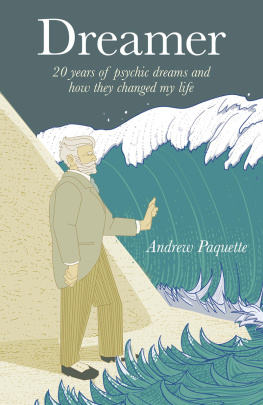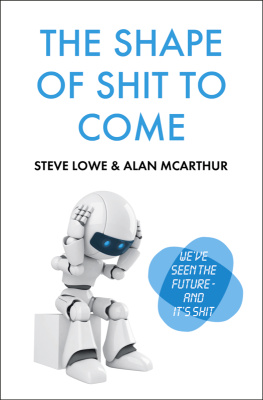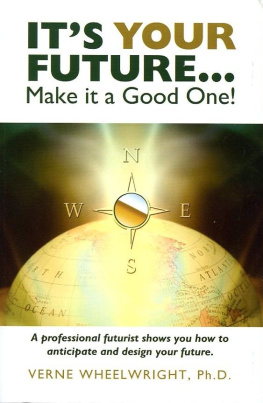First published 2012 by Transaction Publishers
Published 2012 by Routledge
2 Park Square, Milton Park, Abingdon, Oxon OX14 4RN
711 Third Avenue, New York, NY 10017, USA
Routledge is an imprint of the Taylor & Francis Group, an informa business
Copyright 2012 by Taylor & Francis.
All rights reserved. No part of this book may be reprinted or reproduced or utilised in any form or by any electronic, mechanical, or other means, now known or hereafter invented, including photocopying and recording, or in any information storage or retrieval system, without permission in writing from the publishers.
Notice:
Product or corporate names may be trademarks or registered trademarks, and are used only for identification and explanation without intent to infringe.
Library of Congress Catalog Number: 2011015956
Library of Congress Cataloging-in-Publication Data
Bell, Wendell.
Memories of the future / Wendell Bell.
p. cm.
Includes bibliographical references and index.
ISBN 978-1-4128-4262-4
1. Bell, Wendell. 2. SociologistsUnited StatesBiography.
3. ForecastingStudy and teaching. I. Title.
HM479.B45A3 2012
301.092dc23
[B]
2011015956
ISBN 13: 978-1-4128-4262-4 (hbk)
Kai Erikson*
When I was first asked to write a foreword to the memoir that Wendell Bell was then in the process of preparing, I wondered what I could possibly contribute. After all, what can one write about a friend who has just written four hundred pages about himself? Wendell Bell is the grand master of probing the future, and here he was, engaged in the task of probing his own past. He and I have known each other for fifty years and have served on the same faculty for forty-five of those years, which means that he and I look back over half a century of what is now past but what was to us then an emerging future. So what on earth could I add?
You will discover, if you go through this book with the care it richly deserves, that Wendell Bell grew up in a California that was very different from the one that exists now and spent most of his professional life at a university that was very different when he first took a position there than it has become since. I grew up in the same California he did, came to Yale at roughly the same time, and retired from Yale not long after him. The trajectories of our two lives, if traced somewhere on a chart, would suggest as many differences as parallels. But we are of the same generation in more ways than age.
We are both sociologists, for one thing. He and I came up professionally at a time when the discipline was still small enough for those of us who entered it to feel that we knewor at least knew ofmost practitioners of what was then a young field of study. We knew each other as participants in a common intellectual enterpriseand, I would note, so did the publisher of this volume, Irving Louis Horowitz.
Wendy and I also share in common the fact that we each drifted from the West Coast to the East Coast in slow, deliberate stages and that the middle stage in both of those progressions was the Chicago areaWendy at Northwestern University, where he served on the faculty, and I at the University of Chicago, where I did my graduate work.
Wendy came to Yale in 1963 and I in 1966. He offered me the position that I would occupy for the rest of my teaching career, and I accepted it at least in part because it was he who offered it. He had a vision of how a department of sociology might take shape. I obviously liked that vision (although it would be years before I fully understood how large an anomaly it was to at least part of the intellectual life of Yale in those days). In the Yale pattern of governance, a department is headed by a Chair who then appoints a Director of Graduate Studies and a Director of Undergraduate Studies. In the late 1960s, all three of those officers were from that still distant land, California. I can only think of one faculty member who came from New England, and I cannot think of any who went to Yale as undergraduatesor, for that matter, to any other Ivy League school. The faculty Wendy assembled in the 1960s and 1970s, then, could be described as almost alien to what remained of the gentlemanly ways of Yale. Among the topics being studied by that gathering of mostly young sociologists were inner-city barrios, the mentally ill, Amish farmers, metropolitan police officers, Appalachian mountain people, psychiatric nurses, andthis being the main bulk of itordinary people living ordinary lives in places like the Caribbean, Latin America, Southeast Asia, and Africa.
As you will read in these pages, Wendys university gave serious thought in the early 1990s to either dropping sociology altogether or cutting it back so sharply that it would have become no more than a minor feature in the intellectual landscape of Yale. The situation was that Yale was facing a severe budget problem. The usual answer to such a crisis in academic life would have been to cut all existing programs by, say, 5 percent, tightening belts so evenly that no portion of the institutional body would feel unfairly pinched. This time, however, the university chose to eliminate 5 percent of its programs rather than take the risk of weakening them all. That decision took a lot of courage, but it soon proved to have a decisive disadvantage. When a committee of professors and administrators is asked to survey the activities of an entire campus in search of ones to eliminate, they are being invited to participate in something very akin to a projective test. There are no rules governing that process, obviously, and no useful ways to measure the quality or importance of all those programs themselves. So it can easily become a process by which honest and well-meaning individuals have little choice but to reach down inside their own minds and consult whatever subjective leaningswhatever likes and dislikesare to be found down there. What can a great university do without? Philosophy? Organic Chemistry? Art History? Mechanical Engineering? Linguistics?
One of the answers to that question was sociology. Without going into it in any detail, I will point to Wendell Bells vision of what sociology is or should be for that turn of events. I thought then that we were encountering what was left of the old Yale, still lurking in the shadows. The street corners of inner cities, village compounds in Africa, mining camps in Chile are not the kinds of terrain gentlemen scholars traditionally seek wisdom in. The interview transcripts of sheepherders or shopkeepers, the diaries of immigrants, or the testimonies of inmates are not a true literature for persons who look to Milton or Moliere for insights into the human condition.
In the end, the commotion came to nothing. Sociology survived at Yale and has prospered in the time since. There were shifts in the stock market that greatly reduced the urgency of the need for budget cuts. But the department was rescued primarily by the very same thing that had endangered it in the first placeWendys vision of what a sociology program should be. This was because a vast majority of Yale faculty members, once they had a chance to think it through, found it unthinkable that the university would voluntarily divest itself of what was then the only teaching and research program around that paid systematic attention to urban life, to the ways in which race relates to race, class to class, and gender to gender in these United States, to the situation of people in third world countriesand we could continue this list until it included a vast portion of the intellectual setting that Wendy had been so prominent in creating.












